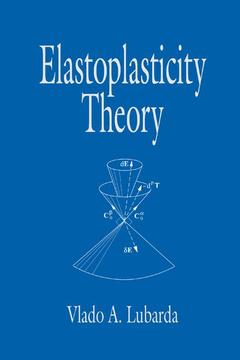Elastoplasticity Theory
Auteur : Lubarda Vlado A.

Understanding the elastoplastic deformation of metals and geomaterials, including the constitutive description of the materials and analysis of structure undergoing plastic deformation, is an essential part of the background required by mechanical, civil, and geotechnical engineers as well as materials scientists. However, most books address the subject at a introductory level and within the infinitesimal strain context.
Elastoplasticity Theory takes a different approach in an advanced treatment presented entirely within the framework of finite deformation. This comprehensive, self-contained text includes an introduction to nonlinear continuum mechanics and nonlinear elasticity. In addition to in-depth analysis of the mathematical and physical theories of plasticity, it furnishes an up-to-date look at contemporary topics, such as plastic stability and localization, monocrystalline plasticity, micro-to-macro transition, and polycrysalline plasticity models.
Elastoplasticity Theory reflects recent trends and advances made in the theory of plasticity over the last four decades. It will not only help stimulate further research in the field, but will enable its readers to confidently select the appropriate constitutive models for the materials or structural members relevant to their own applications.
Date de parution : 10-2019
15.6x23.4 cm
Date de parution : 07-2001
Ouvrage de 638 p.
15.6x23.4 cm
Thèmes d’Elastoplasticity Theory :
Mots-clés :
Deformed Conguration; Current Conguration; Plastic Increments; Deformation Gradient; Principal Stretches; Normality Rule; Fourth Order Tensor; Nominal Stress; Plastic Part; Green Deformation Tensor; Isotropic Function; Jaumann Derivatives; Conjugate Stress; Elastic Symmetry; Yield Surface; Velocity Eld; Positive Denite; Strain Tensors; Current Yield Surface; Strain Space; Elastic Unloading; Macroscopic Deformation Gradient; Laue Group; Elastic Heterogeneity; Strain Energy Function



